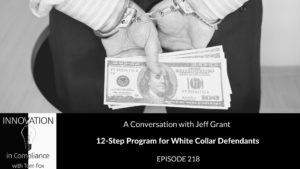
Tom Fox read about Jeff Grant’s work in The New Yorker and was intrigued, so he invited him on this week’s show. Tom describes Jeff’s work as “an unusual professional passion”. Listeners will be inspired by Jeff’s story: what led to his arrest and prison sentence, his redemption, and how he now helps others recover.
“I Was the Problem”
Becoming a lawyer was the perfect fit for Jeff’s skill set and attitude, he tells Tom, but it was “very bad for me in terms of bipolar disorder and my alcohol and drug abuse.” He describes his descent into white-collar crime, his subsequent arrest and resignation from his law practice. A suicide attempt, intervention, and a stint in rehab all contributed to his ‘aha moment’ and the road to recovery. “I was the one who had been doing things wrong, and I didn’t really realize that the whole time,” he recalls. “…that was the turning point that I realized that I was the problem.”
Progressive Prison Ministries
Tom asks Jeff what led him to found Progressive Prison Ministries. Going to prison sober was the catalyst, Jeff replies. He stayed sober throughout his sentence, and on his release, he started to volunteer at criminal justice and drug and alcohol nonprofits. He also went to seminary and became an ordained minister. “I just wanted to help people who were in the same situation we were in,” he tells listeners. He had to go it alone, but he wanted others like him to have someone to turn to for support. “We started this ministry to serve and support people who have been prosecuted for white-collar crimes and their families… It’s people in isolation all over the country who have no one to talk to and no one who understands their plight… We offer them a helping hand both emotionally and spiritually, and also a lot of practical information as well.”
12-Step Approach
Jeff’s approach to helping white-collar offenders recover is based on the Alcoholics Anonymous 12-step program. Unlike AA meetings, however, his meetings are facilitated by leaders. The act of sponsoring someone is ministering to them, he says; your sponsor gives you a lot of advice, in a 12-step sort of way. “The spirit of the steps are there,” he tells Tom. What’s more powerful to him, however, is the fellowship. The Monday meeting is only a small part of it, he tells Tom. He explains how they match members together, and that they keep in contact throughout the week. “It’s like being a cop,” he remarks, “you’re on the job 24 hours a day, and being in recovery is being in recovery 24 hours a day… So this is really a 24-hour a day support network.”
Supporting the Families
Tom asks, “How does the family work into white-collar recovery?” They often have it worse than the defendant, Jeff answers, because they are usually unaware of what the defendant has been doing, and reality hits them “between the eyes with something like an arrest or the FBI showing up at the door.” He comments on the high incidence of divorce and family estrangement and laments that recovery is not advanced even in his network. However, they welcome everyone who needs them, he points out. “We want to provide a place of support and comfort for anybody who doesn’t have a built-in support network or is estranged from their support networks.”
Supporting Attorneys and Grant Law
“I was really intrigued by some of the information on your website, one of which was that the white-collar support group can help attorneys struggling to cope with a broken justice system,” Tom comments. He asks Jeff to explain more about this. We try to help attorneys understand the humanity of white-collar offenders, Jeff responds. “We try to bring a full picture to a very complicated situation that people tend to want to paint with a very broad brush.” He is happy that more defense attorneys, prosecutors, judges, and probation officers want to learn how to integrate Jeff’s theology to be “more just and more merciful and perhaps more lenient” in their dealings with white-collar defendants. He and Tom discuss his own law practice. His entire practice now is with white-collar attorneys, he says. He shares examples of how he helped defendants revise their strategy by asking the right questions. Tom asks him to advise attorneys who may be struggling themselves with the same problems he did. The first step is to admit you have a problem, he says. He outlines the avenues – both personally and professionally – where help is available.
Resources
Jeff Grant on LinkedIn | Twitter
Grant Law
Prisonist.org




